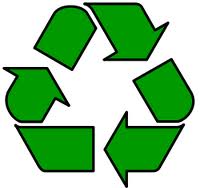Not sure whether you have ever given trash, your’s or that of others, much thought. But here are some statistics. The average amount of waste each person generates has increased from 2.68lbs in 1960 to 4.5lbs in 1990. Luckily that number has held steady due to recycling efforts. However, it still totals about 1.35billion lbs/day or 251 million tons per year!!! Now wait - this is only personal trash, which constitutes 2% of the waste stream – yikes for the industrial waste stream! But let’s stay with our personal garbage, because that's where we can make a difference.
The first rule of thumb is that recycling and composting are good, but buying less stuff is better. Besides, it’s been documented that we can’t gain happiness through consumption. Elizabeth Royte, who wrote a very enlightening book on garbage, says that “We don’t need better ways to get rid of things. We need to not get rid of things, either by keeping them cycling through the system or not… desiring them in the first place.”
But once we have garbage, what are our choices? They are dumping, incinerating, and recycling. FYI - in untreated landfills waste can take 40 to 50 years to decompose, in treated landfills between 5 and 10 years. Yet, plastics may take hundreds of years to decompose! And there are other problems with landfills: their toxicity (supposedly landfills are the largest source of human generated greenhouse gases, although CAFO’s, those enormous industrial animal feeding operations that make supermarket meat are also huge culprits), and the ever increasing amounts of garbage and landfill space needed (1.because of population increase, and 2.because our consumer society model is based on ever increasing consumption– the system breaks down if we stop consuming, and then the politicians scream “recession” - stop screaming with them).
So, what can you do?
- Don’t pick up any more plastic bags from the supermarket, bring your own cloth bags
- Consume less, recycle and compost more
- Use compostable garbage bags, recycled paper products, and products made from recycled plastic
- Buy more groceries and cleaning supplies in bulk, reuse your glass jars and Chinese takeout plastic containers (I wish they would take them back, since I don’t like plastic in the first place), reuse your Ziplock bags a few times
- Subscribe to Freecycle (they are all about giving and getting for free)
- Donate your gently used unwanted stuff instead of throwing it away
- Buy clothes at 2nd-hand stores (I am a huge fan)
- Most of all – stop wanting, wanting, wanting stuff.



